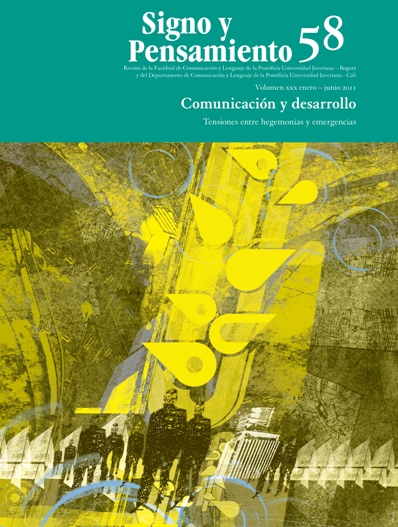Abstract
This paper is a review of key concepts on communication for development and social change form its origins after World War ii, until today. Two main trends have dominated over the five last decades: on the one hand, communication models inspired by modernization theories and techniques derived from the information strategies used by the us Government during World War ii and by the industrial sector struggling to position its post-war products; on the other, communication approaches that emerged in the heat of the social and political struggles against colonial and dictatorial powers imposed on Third World countries, which find their academic and conceptual reference points in the dependency theories.
Downing, J. (1984), Radical Media: The Political Experience of Alternative Communication, Boston, South End Press.
Fraser, C. y Restrepo, S. (1998), Communicating for Development: Human Change for Survival, Londres, Nueva York, Taurus. Freire, P. (1991), ¿Extensión o comunicación? La concientización en el medio rural, México, Siglo xxi [primera edición: 1971, Santiago de Chile, incira).
Gumucio-Dagron, A. (1991), “The Overmarketing of Social-Marketing”, en Development Communication Report (dcr), No. 73, Washington, Academy for Educational Development (aed).
— (2001), Haciendo olas: historias de comunicación participativa para el cambio social, New York, The Rockefeller Foundation.
— (2003), “Take Five: A Handful of Essentials for ICTs in Development”, en: Girard, B. (ed.), The One to Watch, Rome, fao.
— (2010). “Cuando el doctor no sabe: comentarios críticos sobre promoción de la salud, comunicación y participación”, en Estudios sobre las Culturas Contemporáneas, Revista de Investigación y Análisis (pág. 67-93), Época ii, Volumen xvi, Número 31, Verano 2010. Colima: Universidad de Colima.
— y Lupe Cajías, L. (eds.) (1989), Las radios mineras de Bolivia, La Paz, cimca-Unesco. Hornik, R. (1988), Development Communication: Information, Agriculture and Nutrition in the Third World, New York, Longman.
Lerner, D. (1958), The Passing of Traditional Society: Modernizing the Middle East, New York, Free Press.
MacBride, S. (ed.), (1980). Many Voices, One World. Communication and society today and tomorrow, Paris: Unesco.
Moemeka, A. (1994), Communicating for Development: A New Pan-Disciplinary Perspective, Albany, Nueva York, State University of New York Press.
Rogers, E. M. (1962), The Diffusion of Innovations, New York, Free Press of Glencoe.
— (1976), “Communication and Development: The Passing of the Dominant Paradigm”, en: Rogers, E. (ed.), Communication and Development: Critical Perspectives, London: Sage, pp. 121-148.
Servaes, J. (1989), One World, Multiple Cultures: A New Paradigm on Communication for Development, Leuven, Acco.
Tufte, T. (2001). “Entertainment-Education and Participation-Assessing the Communication Strategy of Soul City”, en: Journal of International Communication, vol. 7, núm. 2, pp. 25-51.
This journal is registered under a Creative Commons Attribution 4.0 International Public License. Thus, this work may be reproduced, distributed, and publicly shared in digital format, as long as the names of the authors and Pontificia Universidad Javeriana are acknowledged. Others are allowed to quote, adapt, transform, auto-archive, republish, and create based on this material, for any purpose (even commercial ones), provided the authorship is duly acknowledged, a link to the original work is provided, and it is specified if changes have been made. Pontificia Universidad Javeriana does not hold the rights of published works and the authors are solely responsible for the contents of their works; they keep the moral, intellectual, privacy, and publicity rights.
Approving the intervention of the work (review, copy-editing, translation, layout) and the following outreach, are granted through an use license and not through an assignment of rights. This means the journal and Pontificia Universidad Javeriana cannot be held responsible for any ethical malpractice by the authors. As a consequence of the protection granted by the use license, the journal is not required to publish recantations or modify information already published, unless the errata stems from the editorial management process. Publishing contents in this journal does not generate royalties for contributors.


